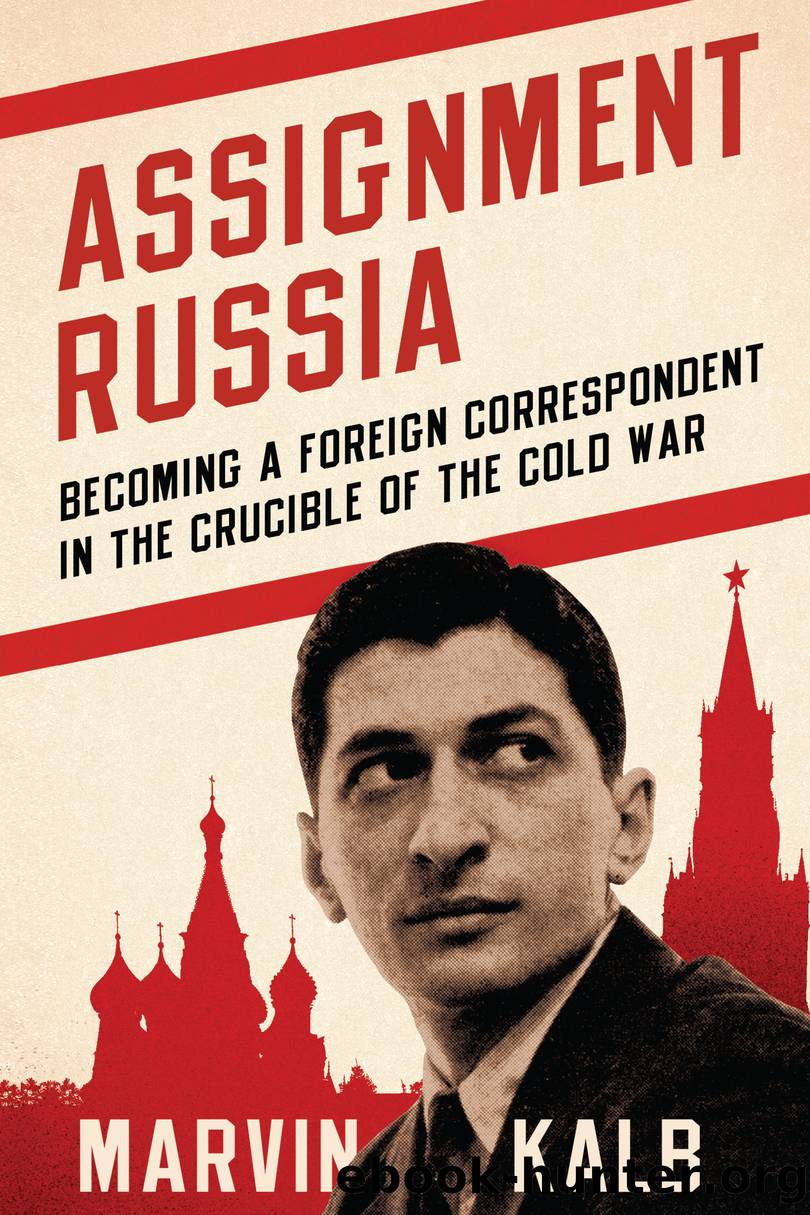Assignment Russia by Marvin Kalb;

Author:Marvin Kalb;
Language: eng
Format: epub
Publisher: Lightning Source Inc. (Tier 3)
* * *
âJAKARTA is not Indonesia.â So observed Bernie, and the morning after our arrival, we were already out of Jakarta and on our way to Bandung, the lovely resort that wise Indonesians once thought about making their capital. Now this comparatively cool jewel thrived in the green mountains of West Java, a roughly five-hour car ride through gorgeous terraced rice fields from the stultifying heat and humidity of the official capital. What we left, scarring the capitalâs heart, was a wide kali, or canal, that served simultaneously as a washing machine, swimming pool, and toilet. Next to a woman on her knees washing her laundry, I saw a young boy peeing into the kali. Foul odors wafted through nearby open-air restaurants. If there were complaints from fussy tourists, they were generally ignored. Betjaks, or cycled rickshaws, nicknamed Paris, Sin-Sin, and even Morris, sliced their way through hot, narrow streets. Most rides cost five rupiahs, bargained down from a starting price of ten. The bargaining was an assumed part of every negotiation. Many people wore straw hats, protection against the brutal tropical sun. Killer mosquitos buzzed incessantly. Jakarta seemed busy and yet listless, a place for slow transactions in business and diplomacy but also a place to leave, if one could, and we did.
What I sensed in Jakarta but learned in Bandung was that the roughly 3 million overseas Chinese who had been living in Indonesia for hundreds of years, even during the 300-year-long era of Dutch colonialism, controlled the economy of Indonesia in much the same way as the Chinese controlled the economy of Thailand. They were the cooks, the librarians, the businessmen, and the bankers. No matter how long they had lived in Indonesia, they remained clannish, at home speaking Chinese, the language of the motherland, but on the streets speaking Bahasa Indonesia, the native language of the people of Indonesia.
The Chinese were everywhere, and they did everything, as in Thailand. If I wanted to buy a shirt, Iâd go to a Chinese haberdasher. If I wanted to buy a book, Iâd go to a Chinese bookstore, one of the many showing Pekingâs propaganda. If I wanted to buy an aspirin, Iâd go to a Chinese drugstore. If I wanted to enjoy an ice cream, Iâd go to a Chinese ice cream parlor. In other words, I was completely dependent on the Chinese businessman, the middleman of the Indonesian economy.
And so too were the 87 million Indonesians, who had begun by the late 1950s to resent their dependence on the Chinese but had not yet been able to come up with an alternative economy. They were frustrated. They demanded anti-Chinese action. The authorities in Jakarta momentarily shook off their customary lethargy and took a series of awkward, ineffective actions designed to undercut the omnipresent power of the ethnic Chinese community. At times feelings rose to such passionate levels that it was easy to imagine a collision between the new nationalism of the average Indonesian and the continuing clout
Download
This site does not store any files on its server. We only index and link to content provided by other sites. Please contact the content providers to delete copyright contents if any and email us, we'll remove relevant links or contents immediately.
Fanny Burney by Claire Harman(26250)
Empire of the Sikhs by Patwant Singh(22774)
Out of India by Michael Foss(16695)
Leonardo da Vinci by Walter Isaacson(12812)
Small Great Things by Jodi Picoult(6691)
The Six Wives Of Henry VIII (WOMEN IN HISTORY) by Fraser Antonia(5242)
The Wind in My Hair by Masih Alinejad(4850)
The Crown by Robert Lacey(4578)
The Lonely City by Olivia Laing(4575)
A Higher Loyalty: Truth, Lies, and Leadership by James Comey(4559)
The Iron Duke by The Iron Duke(4126)
Millionaire: The Philanderer, Gambler, and Duelist Who Invented Modern Finance by Janet Gleeson(4113)
Papillon (English) by Henri Charrière(3918)
Sticky Fingers by Joe Hagan(3916)
Joan of Arc by Mary Gordon(3792)
Alive: The Story of the Andes Survivors by Piers Paul Read(3739)
Stalin by Stephen Kotkin(3731)
Aleister Crowley: The Biography by Tobias Churton(3430)
Ants Among Elephants by Sujatha Gidla(3282)
